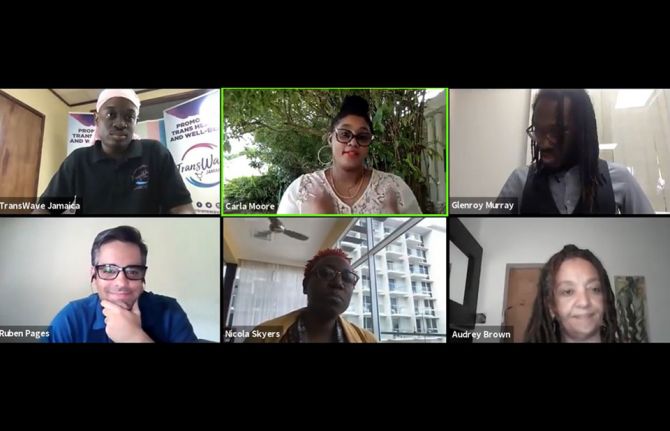



Feature Story
First-ever Jamaica transgender strategy looks beyond health
08 January 2021
08 January 2021 08 January 2021Imagine using a health-care system that has no concept of you as a person, or of your unique needs. Nurses might not ask important questions. Doctors might overlook the solutions you really require. You might feel unwelcome.
That has always been the reality for transgender people in Jamaica. A new strategy seeks to change this.
With support from UNAIDS and the United Nations Population Fund (UNFPA), TransWave Jamaica has launched the Trans and Gender Non-Conforming National Health Strategy, the first of its kind in the English-speaking Caribbean. The five-year plan is a rights-based road map for how the health and well-being of transgender people can be advanced. It moves beyond recommendations for the health-care system to the structural and societal changes necessary to achieve equitable access to services and opportunities for the transgender community.
“Too many transgender people stay home and suffer or change who they are to access public health-care spaces,” explained TransWave Associate Director of Policy and Advocacy, Renae Green. “We need improvement to basic services, including psychosocial support. And we need transgender people to be able to access public health services as their authentic selves.”
Through the Unified Budget, Results and Accountability Framework Country Envelope for Jamaica, UNAIDS collaborated with UNFPA to support a robust year-long process of research, community engagement and strategy development, including a monitoring and evaluation framework. The strategy development process was informed by a multisectorial steering committee composed of civil society organizations, international cooperation partners and government authorities.
HIV is a major priority for the Jamaica transgender community. Around 50% of transgender women participants in two recent studies were living with HIV. But there are other pressing concerns. Two surveys found that around half of transgender respondents were unemployed. One third skip meals. One in ten sells sex to survive. Research conducted in 2020 by TransWave found that half of respondents had been physically assaulted in the past year, with 20% reporting sexual assault. More than 80% had been verbally abused.
“The needs go beyond HIV and health care. Other factors affect people’s ability to be safe, to be adherent or to remain HIV-negative. We should take into account the whole person, not just a part,” said Denise Chevannes-Vogel, HIV and AIDS Officer for the UNFPA Sub-Regional Office for the Caribbean.
“We value the fact that we were able to bring together the community to have a discussion about their needs beyond HIV,” said Ms Green.
The TransWave team led the community needs assessment. Some community requests, such as hormone replacement therapy or gender assignment surgery, are unique. But others are common to all people. They want access to health care and housing, education and employment. And they want to see themselves represented in the civil society spaces where many access care and support.
“We will not reach any AIDS-related targets if we do not prioritize transgender health as a whole. People are dying because of violence, living on the streets, lack of jobs and lack of opportunities. Even the HIV prevention knowledge that most people would acquire through formal education settings is not available to transgender people when they are bullied and forced to drop out. So this process was about reflecting on the impact indicators. What would it take for them to live longer, better lives?” said Ruben Pages, UNAIDS Jamaica’s Community Mobilization Adviser.
But what chance does this comprehensive and forward-thinking strategy have of succeeding in a country famed for its social conservatism? The partners are optimistic. On one hand, the approach calls for longer-term goals, including law reform around issues such as gender identity recognition and decriminalizing sex between same-sex partners. But the strategy is also a practical guide for transgender inclusion in systems and frameworks that are already in place. With targeted action there can be quick wins.
Manoela Manova, the UNAIDS Country Director for Jamaica, said the strategy will help the country accelerate progress to end AIDS.
“Going forward, there will be renewed focus on ensuring that excellent prevention, testing and treatment outcomes are achieved across all communities, especially key and vulnerable populations,” Ms Manova said. “This is an opportunity to make good on our commitment to leave no one behind.”



